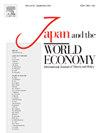Impact of the 2011 earthquake on the real estate market in Tokyo
IF 1.2
4区 经济学
Q3 ECONOMICS
引用次数: 0
Abstract
After the 2011 Great East Japan Earthquake, seismic activity in Japan changed drastically, affecting people’s response to earthquakes even outside the affected area. This change may be heterogeneous depending on where they live, especially if the area is prone to seismic hazards. To measure seismic hazards, the nature of the ground on which a building stands was used as a source of people’s assessment of disaster. Using real estate transaction data and the hedonic approach, this study investigates the heterogeneous impact of the Great East Japan Earthquake on the real estate market in undamaged areas. The analysis of ground classification revealed that the Great East Japan Earthquake led to about 3 % reduction in both land prices and housing prices in the lowland areas in the Tokyo Special Zone, where ground was soft and experienced stronger shaking compared with other areas. The reduction lasted for 5 years before recovering to the pre-disaster level. However, the 2016 Kumamoto Earthquake did not impact land prices in the Tokyo Special Zone.
2011年地震对东京房地产市场的影响
2011年东日本大地震后,日本的地震活动发生了巨大变化,甚至影响了受灾地区以外的人们对地震的反应。这种变化可能是不均匀的,这取决于他们居住的地方,特别是如果该地区容易发生地震灾害。为了测量地震的危险性,建筑物所处地面的性质被用作人们评估灾害的一个来源。本文利用房地产交易数据和享乐主义方法,研究了东日本大地震对未受灾地区房地产市场的异质影响。地面分类分析表明,东日本大地震导致东京特区低地地区的地价和房价下降了约3 %,这些地区的地面较软,比其他地区震动更大。这种减少持续了5年才恢复到灾前水平。然而,2016年熊本地震并没有影响东京特区的地价。
本文章由计算机程序翻译,如有差异,请以英文原文为准。
求助全文
约1分钟内获得全文
求助全文
来源期刊

Japan and the World Economy
ECONOMICS-
CiteScore
2.60
自引率
0.00%
发文量
26
审稿时长
46 days
期刊介绍:
The increase in Japan share of international trade and financial transactions has had a major impact on the world economy in general and on the U.S. economy in particular. The new economic interdependence between Japan and its trading partners created a variety of problems and so raised many issues that require further study. Japan and the World Economy will publish original research in economics, finance, managerial sciences, and marketing that express these concerns.
 求助内容:
求助内容: 应助结果提醒方式:
应助结果提醒方式:


